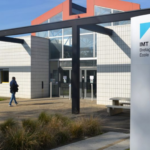

Introduction: The M.Sc. in Robotics and Autonomous Systems program at IMT Atlantique is a cutting-edge program designed to equip students with advanced knowledge and skills in the field of robotics. As industries embrace automation and the integration of intelligent systems, the demand for robotics professionals continues to grow. This program offers a comprehensive curriculum that covers topics such as robotics engineering, artificial intelligence, machine learning, and control systems. Students learn to design, develop, and deploy autonomous robotic systems for various applications, including manufacturing, healthcare, transportation, and more.
Subheading 1: Foundations of Robotics and Control Systems In this program, students acquire a solid foundation in robotics and control systems. They learn the principles of robot kinematics, dynamics, and control, enabling them to understand and manipulate the behavior of robotic systems. Through hands-on projects and laboratory exercises, students gain practical experience in programming and controlling robots using state-of-the-art tools and technologies. They also explore the mathematical foundations of robotics and control, including sensor integration, perception, and motion planning.
Subheading 2: Artificial Intelligence and Machine Learning for Robotics Robotics and artificial intelligence go hand in hand. Students in this program delve into the field of AI and machine learning as it applies to robotics. They explore algorithms and techniques for perception, decision-making, and learning in autonomous systems. Students learn to train robots to perform complex tasks, adapt to dynamic environments, and interact with humans effectively. They also study computer vision, natural language processing, and reinforcement learning, which play crucial roles in enabling robots to perceive and understand their surroundings.
Subheading 3: Applications of Robotics and Autonomous Systems From manufacturing to healthcare and beyond, robotics and autonomous systems find applications in various industries. Students in this program have the opportunity to specialize in specific application domains of their interest. They explore the use of robotics in industrial automation, collaborative robotics, medical robotics, autonomous vehicles, and more. Through industry collaborations and real-world projects, students gain hands-on experience in solving practical challenges and developing innovative robotic solutions. They also learn about ethical considerations, safety standards, and societal implications associated with the deployment of robotics technologies.
Conclusion: The M.Sc. in Robotics and Autonomous Systems program at IMT Atlantique offers a comprehensive and interdisciplinary approach to robotics education. By combining theoretical knowledge with practical experience, students gain the skills necessary to thrive in the rapidly evolving field of robotics. Whether aspiring to work in research and development, robotics engineering, or technology management, graduates of this program are well-prepared for exciting careers at the forefront of automation and intelligent systems. Join IMT Atlantique and embark on a journey of innovation and discovery in the field of robotics and autonomous systems.





